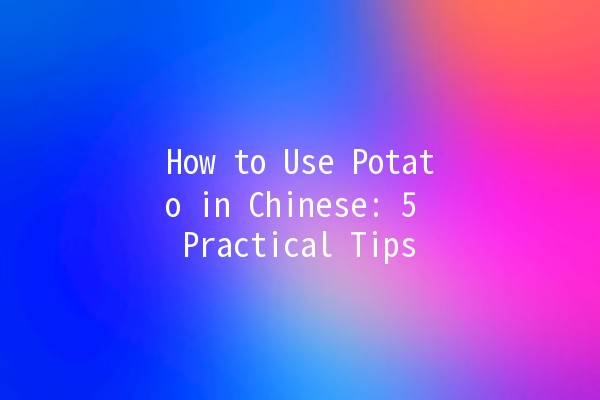The term "potato" is more than just a staple food; it has found various meanings and uses in the Chinese language and culture. Whether used literally or metaphorically, understanding how to incorporate "potato" into your conversations can enhance your Chinese proficiency. In this article, we will explore practical suggestions for using "potato" in Chinese, providing you with essential tips for effective communication and cultural awareness.
Understanding the Basics of "Potato" in Chinese
In Mandarin, "potato" is translated as "土豆" (tǔdòu). The character "土" (tǔ) refers to earth or soil, while "豆" (dòu) means bean. This etymology reflects its agricultural roots and significance in Chinese cuisine. Potatoes are cherished for their versatility, appearing in many dishes, from stirfries to soups, and they also serve as a metaphor in various expressions.
One effective way to incorporate "土豆" into your vocabulary is by using it in daily conversations. Here are some contexts in which "土豆" can be employed:
Examples:

Ordering Food: When you visit a Chinese restaurant, you can specify your food preference. “请给我一个土豆沙拉。” (Qǐng gěi wǒ yīgè tǔdòu shālā.) means "Please give me a potato salad."
Cooking Discussions: If you are sharing a recipe or discussing meal preparations, you can say, “我要做一个土豆炖肉。” (Wǒ yào zuò yīgè tǔdòu dūn ròu.), meaning "I want to make a potato stew."
Shopping: When grocery shopping, you might ask, “土豆在哪里?” (Tǔdòu zài nǎlǐ?), meaning "Where can I find potatoes?"
Using "土豆" in such contexts helps solidify your understanding and makes conversations feel more natural.
In Chinese, "土豆" can also be used metaphorically. This includes being part of slang or idiomatic expressions, which can reveal cultural nuances. For instance, "土豆" (tǔdòu) is sometimes used to refer to someone who is considered clumsy or lacks intelligence, similar to the English saying "not the sharpest tool in the shed."
Examples:
In a lighthearted way, you might say, “他真是个土豆。” (Tā zhēn shì gè tǔdòu.), translating to "He is truly a potato," to imply that someone is not very bright.
Another idiomatic expression could be “像土豆一样沉。” (Xiàng tǔdòu yīyàng chén.), which means "as heavy as a potato," indicating something is burdensome.
Being aware of these metaphorical uses will enhance your conversational skills and cultural comprehension.
Cooking is an integral part of culture, and potatoes are featured in various traditional dishes across China. Engaging in these practices not only improves your cooking skills but also allows you to use "土豆" in relevant contexts.
Examples:
Chinese Dishes: Learn to make traditional potato dishes, such as "土豆丝" (tǔdòu sī shredded potatoes) or "酸辣土豆" (suān là tǔdòu sour and spicy potatoes). As you cook, you can narrate your actions in Mandarin, practicing phrases like, “我在切土豆。” (Wǒ zài qiē tǔdòu.), meaning "I am cutting the potato."
Attending Cooking Classes: Participate in local cooking classes that focus on Chinese dishes. Here, you can not only enhance your culinary skills but also practice terminology related to cooking and food preparation.
These culinary experiences will allow you to further embed the term "土豆" into your language usage.
With technology at our disposal, online platforms provide exciting opportunities to learn and use "土豆" effectively. Many websites, apps, and online courses focus on language learning, offering interactive lessons that include food vocabulary.
Examples:
Language Learning Apps: Platforms like Duolingo or HelloChinese often include vocabulary relating to food, allowing you to practice using "土豆" in sentences and quizzes.
Cooking Shows and YouTube Channels: Search for Chinese cooking channels on YouTube that incorporate English explanations with Chinese terminology. This fusion will make it easier to grasp not just the term "土豆," but also contextual usage through demonstrations.
Leveraging these resources can significantly boost your understanding and proficiency in using "potato" in Chinese.
Another excellent way to practice using "土豆" in reallife situations is by joining language exchange groups, either in person or online. Engaging with native speakers allows for realtime practice and feedback.
Examples:
Meetup Groups: Look for Chinese language or cultural exchange meetups in your local area. You can frequently discuss various topics, including food. Initiating a conversation about your favorite potato dishes can be a great way to practice.
Online Forums: Participate in platforms such as HelloTalk or Tandem, where you can connect with native Chinese speakers. Set up conversations specifically about cooking or food preferences, using "土豆" often to gain comfort with its usage.
In these interactive scenarios, the practical application of "土豆" becomes more intuitive and meaningful.
Frequently Asked Questions
Potatoes hold a unique place in Chinese cuisine. They are a staple ingredient cherished for their versatility and nutritional value. Beyond their culinary applications, potatoes symbolize resilience due to their ability to flourish in diverse soil conditions, paralleling the Chinese spirit of adaptability.
To enhance your vocabulary related to food in Chinese, consider interactive meal preparation sessions, use language apps focused on culinary terms, and watch cooking shows in Mandarin. Practice by describing recipes and culinary experiences in Chinese to solidify your understanding.
Yes! Popular potato dishes include "土豆丝" (shredded potato), "土豆泥" (mashed potatoes), and "西红柿土豆" (potatoes and tomato stew). Trying these dishes will provide practical contexts where you can use and hear "土豆" in various flavors and recipes.
Yes, "土豆" can be colloquially used to describe someone who is clumsy or not very intelligent. However, be mindful of the context, as using it in an insulting manner may not be well received.
"土豆" (tǔdòu) is pronounced with a rising tone on the first syllable and a falling tone on the second syllable. Listening to native speakers through language apps or videos can help you master the pronunciation.
To practice conversational skills, engage in roleplaying scenarios where food ordering or recipe discussions take place. Join language exchange partners to simulate dining experiences, allowing you to utilize vocabulary and phrases related to food naturally.
Using "potato" in your Chinese conversations opens doors to both culinary participation and cultural understanding. By applying these practical tips, engaging in cooking, and joining language exchanges, you'll master "土豆" in no time. Enjoy your journey into the world of potatoes in Chinese!